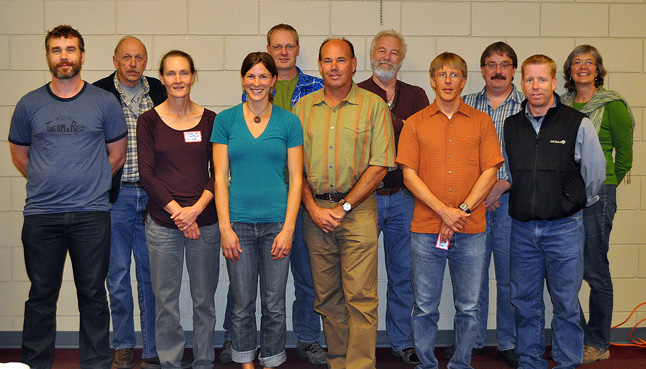
By David F. Rooney
Individuals from across the Columbia Shuswap Regional District recently gathered in Revelstoke to make plans for tackling the growing problem of invasive plants and animals that are establishing toe holds in our midst.
Among those plans is a map that splits the regional district into three areas with members in Revelstoke, Golden and Salmon Arm bearing responsibility for identifying invasive species in their respective areas. Please click here to view the map.
CSISS is also developing a hit list of invasive plants in the CSRD. These range from hawkweed and Himalayan orchids to Dalmatian toadflax and purple loosestrife. Please click here to view the invasive species hit list.
The non-profit society also created its first board of directors (see photo above). The board will meet as needed.
A brief history of the CSISS
Following the retirement of Paul Goodkey, the long-time CSRD noxious weed enforcement officer, the CSRD decided to re-evaluate its noxious weed program. Shortly after, Silverwing Ecological Consulting was hired by the regional district to review the current CSRD Noxious Weed Program and explore alternative delivery models.
On September 27, 2012, land managers met in Revelstoke, BC to assess interest in alternative models for invasive species management. There was strong support for the establishment of an invasive species committee. Due to this feedback and a report generated by Silvering Ecological Consulting, the CSRD Board voted to dissolve the current Noxious Weed Committee on November 8 and support a Non-profit Invasive Species Society. Later that month, on November 23, interested stakeholders again met in Revelstoke to draft and review bylaws and a constitution for the soon to be formed Columbia Shuswap Invasive Species Society.
In February, CSISS submitted its application to obtain non-profit society status which was granted on April 8, 2013. An interim Board of Directors for CSISS was elected in early April and soon after they circulated a job posting for a Coordinator for the Society. Natalie Stafl of Revelstoke was selected and began work on May 13, 2013.
Services Provided
- Toll free calling:
- CSISS provides a toll-free invasive species hotline (1-855-785-9333) where the public can report sightings and weed complaints directly to the CSISS Coordinator. If the Coordinator is not available the call gets forwarded directly to CSISS voicemail which is checked on a daily basis.
- E-mail support:
- The CSISS Coordinator regularly checks the CSISS e-mail account: csinvasives@gmail.com and provides information and support to landowners, partnering agencies and the public (see information requests section).
- Site visits:
- When noxious weed complaints are received about specific properties or concerns regarding priority invasive plants are reported to CSISS, the CSISS Coordinator conducts site visits to the properties in question. Upon site inspection, the coordinator issues management recommendations to the landowner. All site visits associated with weed complaints are documented.
Funding
The Columbia Shuswap Invasive Species Society is very grateful for the financial and in-kind support from partner institutions and funding agencies. The following agencies and organizations have contributed funds or in-kind support to the society:
- The Columbia Shuswap Regional District (CSRD) has contributed $50,000 for CSISS to conduct noxious weed inspections, enforcement and education within the regional district;
- The Ministry of Transportation and Infrastrcture (MOTI) has completed a funding agreement with CSISS for the amount of $6,000 for inventory and strategic planning on Ministry of Transportation right of way. These funds will be paid out at the end of the operational season upon completion of inventory and strategic planning;
- The Ministry of Forests, Lands and Natural Resource Operations (MFLNRO) has contributed $26,000 to CSISS for strategic planning, education and outreach;
- BC Hydro has donated $3,000 for community outreach and interpretive signage in the Revelstoke area;
- The Columbia Basin Trust (CBT) has granted CSISS $10,000 for capital purchases to support CSISS education and outreach initiatives; and
- The Invasive Species Council of BC (ISCBC) has donated $200 in recognition of CSISS’s participation in Community Weed Pulls.



